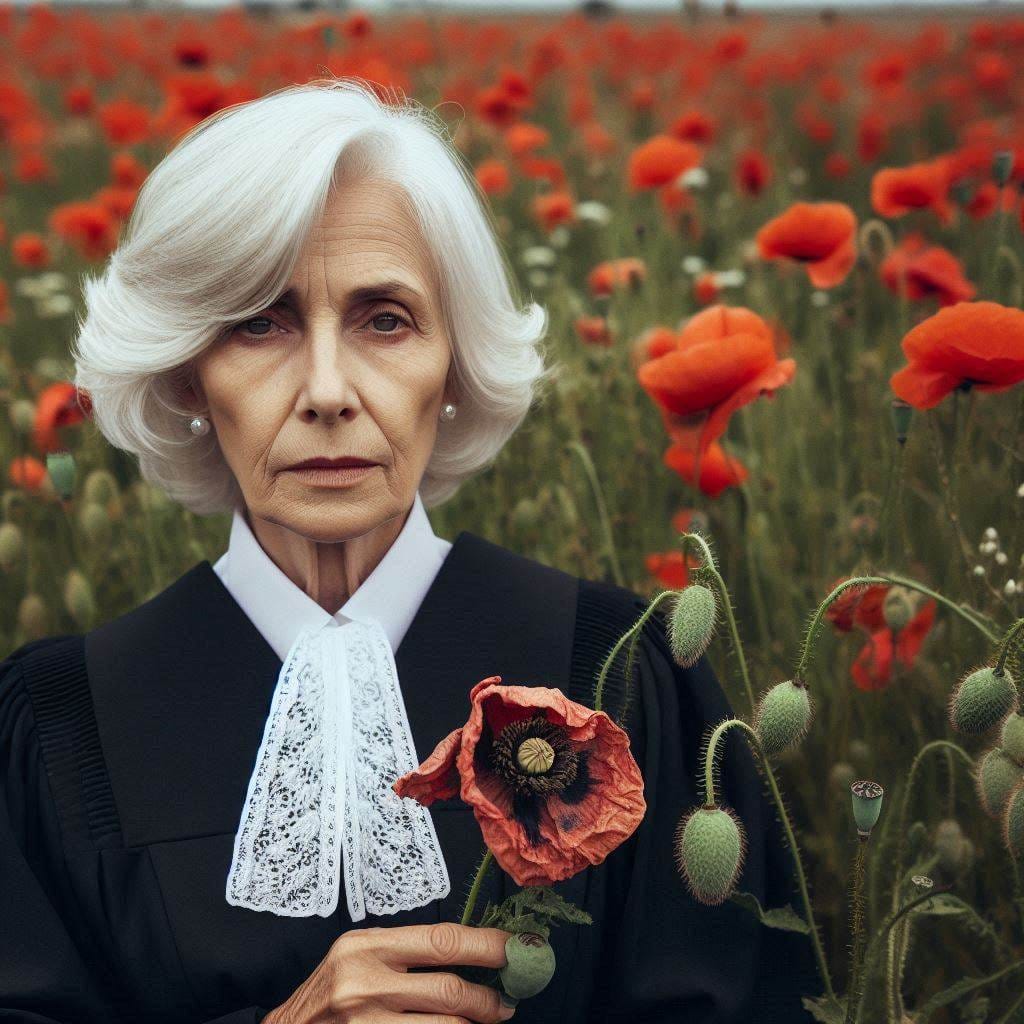Kamala Harris Will Not Be Tall Poppied.

Eighty percent of success is showing up. Woody Allen
Kamala Devi Harris was born on October 20, 1964, in Oakland, California. Her parents were immigrants - her father from Jamaica and her mother from India - who met while studying at UC Berkeley. Harris attended grade school in Berkeley and high school in Montreal when her mother took a research position there. She returned to the U.S. for college, attending Howard University in Washington D.C., where she majored in political science and economics. She then earned her law degree from the University of California, Hastings College of Law.
Harris flunked her California bar exam the first time around. California's bar is one of the most difficult in the nation. Hasting College's pass rate for first time takers is one of the highest at 85-90%. While a correlation exists between first-time passers and student grades, there is no correlation with the professional success of the student. Harris might be such an example.
After law school, Harris began her career in the Alameda County District Attorney's Office. In 1998, she moved to San Francisco, where she became an assistant district attorney, and in 2003, was elected as the District Attorney of San Francisco. Harris became the first African American and first woman to serve as California's Attorney General (2010). She was elected to the U.S. Senate (2016).
Harris lived a very peripatetic life. Born in Oakland, she spent her childhood in Berkeley, moved to Wisconsin and Illinois, and went to high school in Canada. She spent the most time of her adult life in San Franciso.
Harris officially launched her presidential primary campaign on January 21, 2019, with a rally in Oakland, California. Despite an initial surge of enthusiasm and a strong performance in the first Democratic debate, where she confronted Joe Biden on his past positions on busing, her campaign failed to maintain momentum.
Harris struggled with several issues during her campaign that included ideological uncertainty, wavering between progressive and moderate stances; internal campaign discord and strategic inconsistencies; difficulty convincing voters of her electability; and criticism over her record as a prosecutor and attorney general.
Facing declining poll numbers and dwindling financial resources, Harris officially withdrew her candidacy on December 3, 2019, well before the Iowa caucuses or any primary elections.
Winning 2020 presidential candidate Joe Biden said he was considering four Black women to be his running mate. He told MSNBC's Joy Reid: "I am not committed to naming any (of the potential candidates), but the people I've named, and among them there are four Black women."
In 2020, Joe Biden selected Harris as his running mate for the presidential election. On January 20, 2021, Kamala Harris was sworn in as the 49th Vice President. Their campaign held some virtual events and fundraisers, as evidenced by mentions of "virtual organizing calls" and a "largest Zoom call in history" but the campaign trail went cold.
Kamala Harris secured the Democratic presidential nomination for the 2024 election following a series of significant developments within the Democratic Party. Her path to becoming the nominee was accelerated by President Joe Biden's decision to withdraw from the race amid concerns about his age and performance, particularly after a poor showing in a June debate that led to doubts about his re-election prospects.
Once Biden announced his withdrawal and Harris's endorsement, her team quickly mobilized to gather the necessary support from party delegates. She achieved the required commitments from 1,976 delegates within just 32 hours of Biden's announcement, showcasing her strong position within the party. The nomination process was formalized through a virtual roll call vote, which concluded on August 5, 2024, and the Democratic Convention.
Imposter syndrome, also known as imposter phenomenon or impostorism, is a psychological experience characterized by persistent self-doubt regarding one's abilities and accomplishments, accompanied by a fear of being exposed as a fraud despite evidence of success. It was first described in 1978 by psychologists Pauline Rose Clance and Suzanne Imes, who initially observed it among high-achieving women.
Individuals with imposter syndrome often experience a cycle of doubt and anxiety, leading to over-preparation or procrastination. They may exhibit traits such as perfectionism, superheroism (taking on more tasks than others), and a fear of failure or success. Despite external validation, they struggle to internalize achievements and may attribute success to luck or external factors.
Imposter syndrome is not classified as a mental disorder in diagnostic manuals like the DSM or ICD, but it is associated with increased anxiety, depression, and low self-esteem. It is prevalent in high-achieving individuals, particularly in academic and professional settings, and is more common among ethnic minority groups. The syndrome can lead to lower job satisfaction, reduced performance, and higher burnout rates.
Initially thought to be more common in women, recent research indicates that imposter syndrome affects men and women equally. Societal pressures and workplace cultures can exacerbate feelings of inadequacy, especially in environments where individuals feel different from their peers. This phenomenon can hinder personal and professional growth by causing individuals to underestimate their capabilities and achievements.
Imposter syndrome significantly affects high-achieving individuals by fostering persistent self-doubt and a sense of fraudulence despite their accomplishments. High achievers often set unrealistically high standards for themselves, leading to perfectionism. They may over-prepare for tasks or procrastinate due to fear of not meeting their own expectations. This cycle of overworking and self-doubt can be exhausting and counterproductive.
Despite their success, individuals with imposter syndrome live in constant fear of being exposed as frauds. This anxiety can be paralyzing, leading to emotional exhaustion and burnout. The fear of being "found out" can overshadow their achievements and hinder their ability to enjoy success.
High achievers with imposter syndrome often attribute their success to luck, timing, or other external factors rather than their abilities. This lack of internal recognition can lead to a continuous cycle of self-doubt and anxiety. Imposter syndrome can impair well-being, leading to decreased job satisfaction and performance. It is associated with higher rates of anxiety, depression, and burnout, which can further hinder personal and professional growth.
High achievers from minority or marginalized groups may experience imposter syndrome more acutely due to feelings of being the "one and only" in their environment. This can exacerbate feelings of not belonging and increase the pressure to prove themselves.
"The Candidate" is a 1972 American political comedy-drama film directed by Michael Ritchie and starring Robert Redford as Bill McKay, an idealistic young lawyer. The film provides a satirical and critical look at political campaigning in the television era, focusing on McKay's candidacy for the U.S. Senate from California.
Bill McKay is initially reluctant to enter politics, believing he can effect more change as a civil rights lawyer. However, he is persuaded by political consultant Marvin Lucas (played by Peter Boyle) to run against the popular Republican incumbent, Senator Crocker Jarmon. McKay agrees to the campaign because he can speak freely on issues without expecting to win. McKay's chances of winning increase as the campaign progresses, leading him to compromise his ideals. His campaign becomes more image-focused, and he becomes increasingly reliant on his campaign manager and media consultants. This shift reflects the film's critique of modern political campaigns, where image often trumps substance.
The film explores themes of political compromise, media influence, and the loss of personal integrity in pursuit of victory. It portrays the political process as one driven by image and marketing rather than genuine discourse. The screenplay, written by Jeremy Larner, who had experience as a political speechwriter, won an Academy Award for Best Original Screenplay. Critically acclaimed for its realistic depiction of political campaigns, "The Candidate" is noted for its documentary-like style and ironic humor. It captures the disillusionment with politics prevalent in post-1960s America, reflecting a broader societal skepticism towards government leaders at the time.
"The Candidate" explores several key themes related to American politics and campaigning:
1.Political compromise and loss of idealism: The film portrays how Bill McKay, initially an idealistic young lawyer, gradually compromises his principles and beliefs as he becomes more invested in winning the election.
2.Image over substance in modern campaigning: It examines how political campaigns in the television era focus more on crafting a candidate's image rather than substantive policy discussions.
3.The influence of media and advertising in politics: The movie highlights the role of media consultants and advertising techniques in shaping political campaigns and public perception.
4.The grueling nature of campaigning: It depicts the daily grind of campaigning, including the constant public appearances, speeches, and interactions with voters. (Please discount our last and present presidential elections which are exceptions.)
5.The disconnect between politicians and the public: As McKay's campaign progresses, the film shows how he becomes increasingly isolated from the public, surrounded by campaign staff and handlers.
6.Political cynicism and disillusionment: The film reflects the post-1960s American pessimism toward government and political leaders.
7.The power dynamics in politics: It explores the relationships between candidates, campaign managers, party leaders, and other political operatives.
8.The personal cost of political ambition: The movie examines how running for office affects McKay's personal life and sense of self.
9.The famous final line "What do we do now? After winning the election, the famous final line "What do we do now?" suggests a lack of real purpose or plan behind political campaigns.
Harris's campaign handlers have only allowed one media interview which was full of platitudes. She remains the least-known presidential candidate in modern history.
It takes courage to become a TP. You cannot grow tall behind a veil of platitudes, generalities, and joy. On the other hand, you will not be cut down either.
"What do we do now?"
Now if anyone builds on the foundation with gold, silver, precious stones, wood, hay, straw--each one's work will become manifest, for the Day will disclose it, because it will be revealed by fire, and the fire will test what sort of work each one has done. 1 Cor 3: 13-14
Tall Poppy Syndrome Newsletter
Join the newsletter to receive the latest updates in your inbox.



